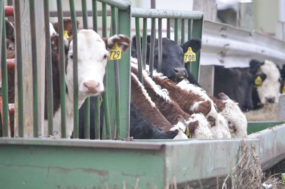Twin Falls County Sheriff Lt. Daron Brown told commissioners the ordinance is aimed in part at owners who consistently struggle to keep livestock off roads and other people's property. Brown shared some personal experience with loose livestock, telling commissioners in a hearing Thursday he collided with an 800-pound heifer in a county vehicle.
"That's a lot of dense weight for a vehicle crash or a motorcycle to run into," Brown said. "And people are injured because of it every year."
The commission delayed a formal vote on the ordinance, but the Times-News reported Friday that a vote could come in the next 10 days.
The ordinance would also help the county recoup costs tied to responding to runaway animals exceeding 25 pounds. Currently, if the county wants to be reimbursed for animal control efforts, it must file a civil action, which can trigger a lengthy and costly court battle against owners who challenge the case.
Under the new ordinance, officers would issue a citation, similar to a traffic offense, that could be adjudicated in a more streamlined, cost-effective manner.
Last week, sheriff deputies responded to a situation near the town of Hollister involving 30 loose cows. Deputies monitored the livestock to make sure none approached busy U.S. Highway 93 until the owner arrived.
While ranchers and dairy farmers don't like the idea of their livestock running loose, some are concerned the ordinance could be used negatively by neighbors.
"Those are our wives, our families, our grandkids that drive those roads, so safety is of paramount importance," said rancher Bill Brockman, a former county commissioner.
Charlie Howell, president of the Magic Valley Cattleman's Association, said his organization supports the public safety goals of the ordinance. But he worries that it lacks the flexibility to give authorities discretion to make judgment calls on whether an offense merits a citation. He suggested warnings for first-time offenders.
But Brown said warnings have been the policy for years and something tougher is needed to send the message.
"We've been giving people warnings for years because we didn't have the teeth to enforce this," he said.
Under the proposal, first-time offenders could be fined up to $50 per animal per day. A second offense within two years could lead to a fine of $100 per animal, per day. A third offense would be classified as a misdemeanor, punishable by fines up to $1,000 and six months in jail, according to the Times-News. ![]()
—AP newswire report
Twin Falls County, Idaho, mulls new animal confinement rules
BUYER'S GUIDE
VISIT OUR BUYER’S GUIDECRYSTALYX is the original low-moisture supplement. Our wide range of targeted formulas covers many feeding situations — from low forage quality to fly control and everything in between. Performance is served with CRYSTALYX.
Scherer Inc. has been in business since 1994 over that time we have grown to a workforce of over 75 employees and we produce product for 2 different industries. Within the mill roll division we also produce replacement hardened steel rolls for the...







